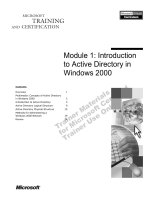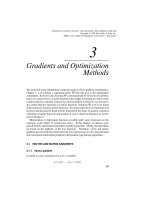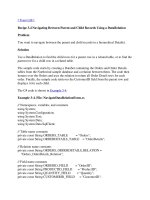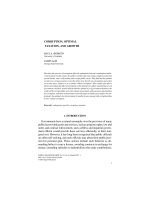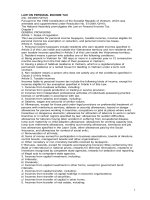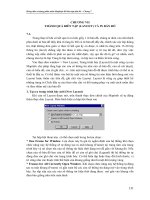Tài liệu Issue 93 – Regulatory and Tax Developments in June 2012 pptx
Bạn đang xem bản rút gọn của tài liệu. Xem và tải ngay bản đầy đủ của tài liệu tại đây (377.42 KB, 12 trang )
FUND NEWS
June 2012
Investment Fund Regulatory and Tax developments in
selected jurisdictions
Regulatory Content
Issue 93 – Regulatory and Tax
Developments in June 2012
European Union
UCITS V, PRIPS and IMD proposals Page 1
ESMA Guidelines on sound remuneration
policies for AIFM
Page 4
ESMA proposes detailed rules on
derivatives, central counterparties and
trade repositories
Page 5
Commission technical standards regarding
Short Selling
Page 5
Agreement on EU Venture Capital and
Social entrepreneurship funds
Page 5
Cyprus
UCITS IV transposed
Page 6
France
AMF consults on AIFMD
Page 6
AMF consults on Inducements
Page 7
The Netherlands
AIFMD Implementation
Regulatory News
European Union
European Commission presents
legislative package to improve
investor protection
On 3 July 2012, the European
Commission (EC) proposed a package of
measures to rebuild consumer trust in
financial markets and align rules across
competing products. The package is
composed of three legislative proposals:
a proposal aiming at updating the UCITS
framework (UCITS V), a proposal for a
regulation on the ‘’key information
document for packaged retail
investment products’’ (PRIPS) and a
revision of the Insurance Mediation
Directive (IMD).
UCITS V
One year after the entry into force of the
UCITS IV Directive, the EC published a
UCITS revision – called ‘‘UCITS V’’ –
which focuses on harmonizing the role
and liability of UCITS depositaries, the
remuneration of UCITS managers and
Page 8
UK
The FSA has proposed to delay for a year the
Page 9
implementation of COBS 14.4
Tax Content
The Netherlands
CAA with USA re closed FGR
Page 10
UK
Reclaims of excess Withholding Tax
deducted from dividend and interest income
in Taiwan – a ruling for OEICs
Page 10
Luxembourg
Aberdeen E-alert
1
Page 11
Fund News – June 2012
sanctions. The aim of the proposal is to
enhance investor protection in the wake
of the financial crisis, the Lehman
bankruptcy and the Madoff fraud. The
proposal takes the form of a Directive. It
will now go to the European Parliament
and the Council for their consideration
under the co-decision procedure. Once
they reach agreement, Member States
usually have two years to transpose the
provisions into their national laws and
regulations, meaning that the new rules
could apply, according to the European
Commission, by the end of 2014. By this
date, the necessary package of
implementing measures should also be
adopted.
The legislative proposal also strengthens
rules relating to delegation of
depositary’s tasks and adds clarification
on the depositary’s liability. The
depositary will be liable for the loss by
the depositary or a third party to whom
the custody of financial instruments has
been delegated, unless it can prove that
the loss has arisen as a result of an
external event beyond its reasonable
control, the consequences of which
would have been unavoidable despite all
reasonable efforts to the contrary.
Furthermore, to the contrary of the
AIFMD, the depositary liability cannot be
delegated or transferred through a
contract with third parties.
1. Depositary rules
2. Managers remuneration
The proposal aims at establishing more
detailed depositary rules which are
essentially the same requirements as
those within the Alternative Investment
Fund Managers Directive (AIFMD). Each
UCITS fund is required to have a single
depositary, with a written contract. The
EC also wants to define more precisely
the types of entities which can act as
depositaries – a credit institution, an
investment firm subject to capital
adequacy standards or an investment
company or management companies
acting on behalf of the UCITS that was
appointed as a custodian before the
entry into force of this Directive. The
proposal also introduces several detailed
duties for the depositary such as
safekeeping, cash monitoring and
oversight duties. The depositary will
need to ensure it does not undertake
activities that could create a conflict of
interest between the UCITS, the
investors, the Management Company
and the depositary.
The draft UCITS V Directive aligns with
the AIFMD in stating that remuneration
policies should be put in place to ensure
the sound management of risks and
control of risk-taking behaviour, for those
categories of staff whose professional
activities have a material impact on the
risk profiles of the UCITS they manage.
The remuneration policies and practices
have to cover salaries and discretionary
pension benefits. Remuneration policies
should also be designed to discourage
any risk-taking which is inconsistent with
the UCITS risk profile or constitutional
documents and should help to prevent
conflicts of interests and protect
investor interests. There is also a
requirement for the UCITS management
company to provide a disclosure in the
annual report. Furthermore, the proposal
lists the principles that the Management
Company will have to comply with in
order to have remuneration policies that
are appropriate to their size, internal
organization and nature, scope and
complexity of their activities.
3. Sanctions
The proposal allows national authorities
to take administrative sanctions against
the management body or any other
individuals who under national law are
responsible for the breach. The draft
UCITS V Directive requires that the
sanctions should be effective,
proportionate and dissuasive. It also
requires Member States competent
authorities to publish any sanction or
measure imposed for breach of the
national provisions adopted following the
implementation of this Directive without
undue delay, including information on
the type and nature of the breach and
the identity of persons responsible for it,
unless such publication would seriously
jeopardise the stability of financial
markets. A catalogue of sanctions is
drafted and the proposal details the type
of administrative sanctions and
measures the national competent
authority applies.
The Commission’s proposal is available
here (provisional version).
2
Fund News – June 2012
PRIPS
The PRIPS proposal aims to improve
transparency in the investment market
for retail investors. For this, the
consumers should be informed in a
short and standardized format that is
easy to understand: the ``Key
Information Document`` (KID). The
European Commission seeks to help
retail investors to make a more informed
decision on whether an investment is
right for them or not and be able to
compare investment products with each
other. Each KID will have to follow a
common standard as regards structure,
content and presentation and will need
to provide consumers with information
on the product’s main features, risks and
costs associated with the investment in
that product. The KID will serve as a
stand-alone document in the sense that
retail investors should not be required to
read other documents to be able to
understand the key features of the
investment product and take an
informed investment decision, and it
should be clearly distinct from marketing
materials.
However, the proposal only requires
manufacturers of investment products
to produce a KID when the products are
to be sold to retail investors. KIDs do not
need to be produced where the
products are to be sold to professional
investors only. The Commission’s
proposal also sets out that it does not
apply to insurance products that do not
offer investment opportunities as well as
occupational pension schemes or
pension products for which the
employer is required by law to
contribute financially and where the
employee has no choice as to the
pension provider. Furthermore, the
Regulation does not apply to certain
securities that are already covered by
the Prospectus Directive and other
securities which do not embed a
derivative. Also the proposal does not
apply to direct investments of retail
investors (e.g. directly buying shares in
companies or sovereign bonds) as in this
case banks, insurers and fund managers
are not “packaging” the investment into
a product to be marketed and sold to
retail investors. Finally, simple savings
products are also not covered, because
they are easier to understand and
compare.
The proposal takes the form of a
Regulation and would therefore not
require implementation into national law
but will be directly applicable in all
Member States shortly after it gets
adopted. The Regulation would also be
supported by detailed
delegated/implementing acts to
standardize the presentation of
information required by the Regulation
as far as possible.
The Commission’s proposal here
(provisional version) will now go to the
European Parliament and the Council for
their consideration under the co-decision
procedure. The final Regulation is
expected to be in place by the end of
2014.
While such disclosures for UCITS have
already been introduced by UCITS IV,
the PRIPS proposal wants to introduce
this concept to all other packaged retail
investment products that are being
offered to retail investors. The list of
products for which a KID will be required
includes all types of investment funds,
insurance-based investments and retail
structured products, in addition to
private pensions. The proposal requires
all manufacturers of these investment
products (e.g. investment fund
managers, insurers, banks) to produce a
KID for each investment product.
3
Fund News – June 2012
IMD
The European Commission has also
published a proposed Directive to
amend and replace the Insurance
Mediation Directive (IMD), known as
"IMD 2". The IMD 1 regulates selling
practices for all insurance products,
including both general insurance
products (e.g. motor and household
insurance) and those containing
investment elements. The proposed
IMD 2 Directive seeks to improve
regulation in the retail insurance market
and policyholder protection. The main
aspects of the Commission’s proposal
are:
•
Expansion of the scope of
application of IMD 1 to all
distribution channels
•
Rules on conflict of interest
•
Administrative sanctions
•
Measures for breach of key
provisions of IMD 1
•
Rules to enhance the suitability and
objectiveness of advice (disclosure
of actual amounts of commission)
•
Procedure for cross-border entries
to insurance markets across the EU
The Commission’s proposal is available
here (provisional version).
ESMA proposes Guidelines on sound
remuneration policies for AIFM
On 28 June 2012 the European
Securities and Markets Authority
(ESMA) issued a 104 page consultation
paper (ref: ESMA 2012/406) setting out
formal proposals for guidelines on sound
remuneration policies for Managers that
fall under the scope of the Alternative
Investment Fund Managers Directive
(AIFMD).
The remuneration requirements will
apply to all AIFMs which are within the
scope of the Directive, however those
non-EU AIFMs that use the national
private placement regimes to market to
professional investors in the EU will only
be subject to the rules on remuneration
disclosure.
The guidelines are broadly aligned with
remuneration policies in other financial
sectors and ESMA has cooperated
closely with the European Banking
Authority (EBA) in drafting the proposals.
According to ESMA the remuneration
policies should principally address
alignment of interests between the fund
investors and the portfolio managers
who make investments on behalf of the
funds. The guidelines are divided into
three main parts: governance, risk
alignment and transparency with the
principle of proportionality relevant for all
three parts.
For the purposes of the guidelines
remuneration consists of all forms of
payments or benefits paid by the AIFM
or paid by the AIF itself, including fixed
or variable monetary and non-monetary
benefits. This would include carried
interest, shares, options and pension
contributions. Ancillary payments or
benefits that are part of a general, nondiscretionary, AIFM-wide policy and
pose no incentive effects in terms of risk
assumption can be excluded from the
definition of remuneration for the
purposes of the AIFMD-specific risk
alignment remuneration requirements.
Any payment made directly by the AIF to
the benefit of the selected staff which
consists of a pro-rata return on any
investment made by those staff
members into the AIF should not be
subject to any of the remuneration
requirements. Fees and commissions
received by intermediaries and external
service providers in case of outsourced
activities are not covered by the
guidelines.
The consultation runs until 27
September and ESMA aims to publish a
final report before the end of 2012, so
that they will be in place in advance of
the AIFMD transposition deadline of 22
July 2013. The full paper is available via
the following web link:
4
Fund News – June 2012
ESMA proposes detailed rules on
derivatives, central counterparties
and trade repositories
•
On 25 June 2012 ESMA launched a
•
consultation paper (ref: ESMA 2012/379)
on technical standards under the
European Markets and Infrastructure
Regulation (EMIR) governing OTC
derivatives, central counterparties (CCP)
and trade repositories that was adopted
by Parliament on 29 March 2012.
Defining the trade repositories’ data
to be made available to relevant
authorities;
rules also detail how ESMA is to
determine the shares which are exempt
from the Short Selling Regulation by
virtue of their principal trading venue
Setting the information to be
provided to ESMA for the
authorisation and supervision of
trade repositories.
The consultation closes on 5 August
2012 and the final draft standards are
intended to be submitted to the EU
Commission for endorsement by 30
The requirements set out in the draft
September 2012. The 293 page
technical standards include:
being outside the Union.
In order to fully implement the Short
Selling Regulation, two final measures –
a Regulatory Technical Standard and a
Delegated Act – are expected to be
adopted shortly.
The technical standards are available
here:
consultation paper is available via the
following web link:
•
•
Defining the framework for the
application of the clearing obligation;
Specifying the risk mitigation
techniques for OTC derivatives not
centrally cleared;
Commission adopts technical
standards regarding Short Selling
Political agreement on EU Venture
Capital and Social entrepreneurship
funds
On 29 June 2012 the Danish EU
•
A comprehensive set of
organisational, conduct of business
and prudential requirements for
CCPs;
Specifying the details of derivatives
transactions that need to be
reported to trade repositories;
reached a political agreement about a
standards, based on the work of the
European label for venture capital and
European Securities and Markets
social entrepreneurship funds in the EU.
Authority (ESMA), setting out the
The Regulations which were initially
detailed rules aimed at reducing the risk
proposed in December 2011 will need to
of settlement failures linked to naked
be officially adopted by Council and
short selling, as well as the means by
Parliament and will enter into force
which market participants should
thereafter. No transposition into national
disclose significant short positions to the
law will be required. The announcement
market. The technical standards specify
•
Laying down the requirements for
the application of exemptions to
non-financial counterparties and
intragroup transactions.
Presidency announced that it has
Commission adopted technical
•
On 29 June 2012 the European
is available here:
the details of the so-called "locate rule,"
which ensures that short sales do not
result in a failure to deliver. The new
5
Fund News – June 2012
action initiated by transposing the
AIFs’ eligibility rules for institutional
the Paris financial centre more
UCITS IV transposed
investors, as well as reviewing the
UCITS IV Directive, in order to make
Cyprus
investors.
attractive to fund managers and
investors.
On 15 June 2012 the UCI Law of 2012
4.
Ensure a level playing field for
depositaries. The Committee
came into effect after the Cyprus House
transposition of the UCITS IV Directive.
analysed the challenges that the
the Directive to give fresh impetus
2.
Seizing the opportunities created by
AIFM Directive raises for French
to French fund managers.
of Representatives passed into law the
depositaries in terms of
competition, given that French
The Committee recommends
depositaries are already compliant to
maintaining a single management
a large extent with the provisions. It
company regime, which can be
recommends consolidating the
modulated through a specific
current framework and seizing the
program of operations that matches
opportunities created by the
the features of each type of
On 15 June 2012 the Autorité des
Directive to develop additional
strategy. With regard to the
Marchés Financiers (AMF), the French
activities. The Committee also calls
requirement for the risk control
regulator, launched a public consultation
for a level playing field between
function, the report advocates
based on a draft report published by the
French depositaries and branches of
applying the proportionality principle,
AIFMD Stakeholders’ Committee (the
foreign investment services
for example, in the case of
Committee) that contains twenty-five
providers.
managers of private equity or real
recommendations for transposing the
estate funds.
France
Public consultation by the AMF
regarding the transposition of the
AIFM Directive
AIFM Directive.
2012. The full text is available via the
3.
The draft report highlights the
The consultation will close on 6 July
Reshaping the range of French
following web link: -
funds to make it clearer.
france.org/documents/general/10443_1.
substantial lead enjoyed by the French
fund management industry in terms of
The Committee recommends
compliance with the Directive’s
reshaping and simplifying the
requirements and the role that some
regulatory range of French funds
funds, such as private equity funds, play
into three categories:
in financing the French economy.
The draft report calls for the Directive to
•
•
UCITS,
•
AIFs marketed to professional
investors.
be implemented faithfully and makes
recommendations in the following areas:
1.
Stepping up international promotion
of the Paris financial centre.
The Committee recommends
promoting French fund
management of alternative
investment funds (AIFs)
internationally by intensifying the
AIFs marketed to retail
investors (including retail nonUCITS or other specialised retail
funds)
The report also recommends
harmonising subscription thresholds
designed to ensure that the most
complex and riskiest products are
marketed only to professional
6
Fund News – June 2012
The purchase of an occasional
Public consultation by the AMF
regarding inducements received in
the course of the marketing and
indirect distribution of financial
instruments
Where the portfolio manager makes
On 7 June 2012 the AMF launched a
conflict of interest may be managed
service complemented by additional
in two different ways: either by a
services during the time span of the
complete absence of inducements
investment that would lead to
(management companies not having
continuous remuneration over the
financial instruments.
to pay for the distribution of their
same period.
The consultation presents a summary of
handover of payments to clients
findings taken from an analysis of some
(thus eliminating the conflict of
50 reports on these areas sent to the
interest arising from the payment by
AMF by investment services compliance
the suppliers of various
officers. However, it does not cover
inducements, since the portfolio
matters relating to remuneration and
managers remuneration is not
benefits received by trading facilities
affected by the choices he makes
that execute client orders.
on behalf of his client). The AMF
1
investment decisions on behalf of
service that would lead to a once off
the client, the AMF considers that
payment.
this could lead to a conflict of
interest. According to the AMF, this
public consultation concerning
inducements received in the course of
the marketing and indirect distribution of
2
The purchase of an occasional
UCITS any longer), or by the full
also mentions that to restore their
The following are the main positions and
September 2012. The full text is
available via the following web link:
profit margins, portfolio managers
recommendations of the AMF:
The consultation will close on 7
should increase their fixed
management fee.
•
Ensure that the receipt of
remuneration or monetary benefit
•
Improving customer service and the
does not compromise the obligation
duty to act in the best interests of
to act in the best interests of the
clients in the provision of
client.
investment advice.
The AMF recommends verification
The AMF makes a distinction
that the expected level of
between remuneration received in
inducements for a given product is
the long run and remuneration
in line with the normal practices of
incentives with threshold effects.
other product providers of
comparable French products.
•
Improving customer service in
reception and transmission of client
•
Improve customer service and the
orders services and execution
duty to act in the best interests of
services.
clients in the provision of portfolio
management services.
The AMF also recommends that
when entering into a relationship,
the client should be able to choose
between:
7
Fund News – June 2012
The Netherlands
However, the proposed law does not
use the word “alternative” when
AIFMD Implementation
referring to the first type of investment
On 19 April 2012 the Ministry of Finance
government expects that most
submitted a legislative proposal to the
investment institutions will fall into that
Dutch Parliament for the implementation
category and the name could otherwise
of the Alternative Investment Fund
be misleading. Therefore, all alternative
Managers Directive (AIFMD). The
investment funds are referred to simply
proposed law will amend the Dutch Act
as investment institutions. Also
on Financial Supervision (DFSA), the
provisions for the two categories are set
Dutch Civil Code, the Dutch Economic
out in separate sections of the DFSA.
institutions because the Dutch
Offences Act and several tax laws.
2. Marketing to retail investors
Together with this law, the Ministry of
Finance published an explanatory
The proposed law sets out that
memorandum and a report issued after
marketing of AIFs to non-professional
the Council of State had rendered its
investors in the Netherlands will be
advice. In addition, the Dutch Ministry of
subject to additional “Netherlands-
Finance will adopt a set of rules
specific” requirements. These
implementing the AIFMD via
requirements will relate to additional
regulations.
investor disclosures (e.g. KID) and
further investor protection rules
The Proposal seeks to implement the
(affiliation to the Dutch dispute
AIFMD on a 1:1 basis. However, the
resolution institute – KiFiD). However
Ministry of Finance has made use of
the exact requirements for this are set
their freedom of implementation in
to be determined by regulations at a
several instances where the AIFMD
later point.
explicitly permits stricter requirements
or adjustments of the implementation by
the Member States.
1. Categories of investment institutions
The Proposal differentiates between two
types of “investment institutions”:
•
Investment institutions that are
referred to in the AIFMD as
alternative investment funds
•
UCITS
relation to shares or units of funds;
•
reception and transmission of orders
in relation to financial instruments.
4. AIFM from designated states
Currently AIFM from certain countries
do not require a licence to offer services
in the Netherlands as they are assumed
to be subject to adequate supervision in
their home state. These designated
states are Luxembourg, France, Ireland,
Malta, the UK, Guernsey, Jersey and the
US (if the manager is SEC registered).
Following the implementation of the
AIFMD, this designated states regime
will become obsolete for EU-AIFM.
However, the proposed law sets out
that AIFMs from Guernsey, Jersey and
the US can still rely on the designated
states regime after the proposed law
comes into effect.
5. Depositaries
The Proposal introduces a lighter
depositary regime for certain closed-end
funds that do not allow redemptions
3. Additional services
within 5 years after the initial investment
The Proposal allows AIFM’s to perform
“non-core” activities (mentioned in
Article 6.4(b) of the AIFMD) that fall
within the scope of the Markets in
Financial Instruments Directive (MiFID),
without needing to obtain a separate
MiFID licence. A Dutch AIFM would
therefore be able to perform following
additional services:
instruments that need to be held in
and do not invest into financial
custody (e.g. real estate and private
equity funds). Managers of these types
of funds will be able to appoint an entity
which carries out depositary functions as
part of its professional registration
recognized by law or legal or regulatory
provisions or rules of professional
conduct (e.g. notaries and lawyers). The
•
investment advice;
specific requirements for this will be set
out in regulations at a later point.
•
safe-keeping and administration in
8
Fund News – June 2012
6. Private placement regime
licence before performing any activities
as AIFM.
The proposed law provides that current
private placement rules will stay in force.
However, they can only be relied upon
The bill is available here (in Dutch only).
UK
The FSA has proposed to delay for a
year the implementation of COBS
14.4
by non-EU AIFMs and “small EU
AIFMs” (i.e. AIFMs which are below the
threshold of the AIFMD). All other
AIFMs will have to obtain an AIFM
licence from the Dutch Authority for the
Financial Markets (AFM). In addition,
AIFMs that wish to rely on private
placement will need to register with the
AFM, perform regular filings concerning
their activities and notify the AFM if they
no longer meet the conditions set out in
the proposed law.
In its quarterly consultation paper
number 33 (“CP 12/11”) the Financial
Services Authority (“FSA”) has proposed
to defer its implementation of COB 14.4
for 12 months to 31 December 2013.
The FSA will consult further but has
emphasised that it is not minded to
change COBS 14.4 which will require
platform operators and nominee
companies to provide information and
voting rights to the beneficial owners of
7. Tax
units in authorised funds. The FSA
The current Dutch tax regime sets out
between direct investing and holding
that an entity is considered to be a tax
units via a nominee are not acceptable
resident in the Netherlands if its
and must be reduced, however it
effective place of management is in the
accepts that there are issues that need
Netherlands. The proposed amendment
to be resolved before implementation
to the tax law sets out that AIFs
and will consult further once this
authorised or registered for the first time
extension is in place.
in another EU Member State will not be
considered as a Dutch tax resident even
if managed by a Dutch AIFM, provided
that (a) the AIF is incorporated in that
other EU Member State, and (b) the AIF
invests passively (in accordance with the
special Dutch tax regime of the Fiscal
maintains the view that the differences
CP 12/11 is available via this link and the
content is in chapter 8 on pages 42 to
45, and appendix 8 (one page):
/>12-11.pdf
Investment Institution).
8. Timing
Dutch AIFMs that are authorised before
the new legislation enters into effect
must apply for a licence no later than 22
July 2014. Dutch AIFMs that become
active after the new legislation has
entered into force will have to obtain a
9
Fund News – June 2012
Tax News
UK
The Netherlands
CAA with USA re closed FGR
The Netherlands have concluded a new
Competent Authority Agreement (CAA)
with the USA regarding the tax
treatment of a Dutch closed FGR
('besloten fonds voor gemene
between the Netherlands and the USA.
In a earlier CAA (concluded in 2007) it
was already agreed to treat a closed
FGR as tax transparent in case of Dutch
qualifying tax exempt entities (such as
rekening').
pension funds) investing in it.
A closed FGR is treated as tax
Previously, the Netherlands have
transparent for Dutch tax purposes. This
implies that all income and gains derived
through such FGR are attributed to the
investors in proportion to their
participations in the FGR. FGRs are
frequently used for asset pooling by
concluded similar CAAs with Canada,
Denmark, Norway and the United
Kingdom. Furthermore, in the Protocol
to the new Germany-Netherlands tax
treaty (expected to be effective as of 1
January 2014) it is stated that the closed
pension funds and other investors.
FGR will be treated as tax transparent. It
In the new CAA the US tax authorities
countries will follow.
confirm that a closed FGR will also be
regarded as tax transparent for the
application of the tax treaty concluded
is expected that agreements with other
The CAA is available via the following
web link:
Reclaims of excess Withholding Tax
deducted from dividend and interest
income in Taiwan – a ruling for OEICs
Tax ruling No.10104553490 was issued
by the Taiwan Ministry of Finance
(“MOF”) on 4 June 2012, and states
that UK OEICs are able to apply for the
reduced withholding rate pursuant to the
Taiwan-UK Double Taxation agreement
provided specified documents are
submitted. A translation prepared by
KPMG Taiwan for your reference can be
found here.
Clarifications from the Taiwan MOF have
provided the necessary detail for
successful reclaims of withholding taxes
to be filed with the Taiwanese tax
authorities. Historically, the rates of tax
agreed under the tax treaty with Taiwan
have not been forthcoming due to the
administrative difficulties encountered.
However, MOF Interpretation Letters
provided in 2007 and a subsequent
ruling for Authorised Unit Trusts (in
2009) clarified the position to the extent
that successful reclaims of withholding
tax have now been processed over the
last few years. The recent ruling will
now ensure that the same will apply for
UK OEICs providing certain criteria are
met.
The process in Taiwan is complicated by
the fact that the Foreign Institutional
Investor must appoint a tax or business
agent in Taiwan in order to apply for the
necessary approval letters from the
10
Fund News – June 2012
National Tax Administration Offices and
provide a number of pieces of
Luxembourg
New KPMG Publication
documentary evidence in order to
support their claim. The documentary
evidence required is also significantly
more comprehensive than in other
reclaim markets and differs between
Aberdeen E-alert
The latest Aberdeen E-Alert Issue 201209 (tax newsletter focusing on
Evolving Investment
Management Regulation: A
clear path ahead?
funds and corporate investors.
withholding tax reclaims based on the
In addition to the clarification on reclaims
developments in Sweden with the
We are pleased to announce the release
the MOF also detailed procedures
reimbursement of WHT for Luxembourg
of Evolving Investment Management
available to obtain relief at source on
FCPs confirmed.
Regulation: A clear path ahead?
dividend and interest income. Again
investors will need to appoint a tax
agent or business agent in Taiwan in
order to make the necessary
applications.
Aberdeen case law) discusses positive
The full text of the e-alert is available via
the following web link.
Regulators around the globe have
continued to develop regulation
implementing existing G20 decisions and
continue to consult on additional
Reclaims of withholding tax can be
made within five years from the date of
remittance to the local tax office by the
tax withholder of the taxes withheld
from the payments of dividend and
measures to take. This report provides
investment managers with an overview of
the regulatory landscape, a summary of
upcoming regulations and the key
interest income. Therefore, potential
implications for businesses. It highlights
claims can be made for excess taxes
how the volume and complexity of
withheld from payments of dividends
regulatory change being implemented will
and interests since 2007 and KPMG in
result in an untraveled road ahead for the
the UK would encourage investors to
review their receipts of these income
payments since June 2007.
investment management industry.
This report is part of our “Evolving
KPMG in the UK has considerable
Regulation” series, following our reports
experience of making these claims,
Evolving insurance regulation and Evolving
including appointing KPMG in Taiwan to
act as tax agent: if you would like help
with a claim please get in touch with
your usual Tax & Pensions contact or
banking regulation produced by the
Financial Services Regulatory Centers of
Excellence.
Simon Chapman (email:
tel: +44
The report is available here:
161 2464408).
11
Fund News – June 2012
Publications
Contact us
Dee Ruddy
Senior Manager
T: + 352 22 5151 7369
E:
Charles Muller
Partner
T: +352 22 5151 7950
E:
Audit
Nathalie Dogniez
Partner
T: + 352 22 5151 6253
E:
Tax
Georges Bock
Partner
T: + 352 22 5151 5522
E:
Advisory
Vincent Heymans
Partner
T: +352 22 5151 7917
E:
www.kpmg.lu
The evolution of
an industry –
2012
KPMG/AIMA
Global Hedge
Fund Survey
here:
Dodd-Frank for
Foreign Financial
Institutions Geared up for
change? here:
The information contained herein is of a general nature and is not intended to address the circumstances of any particular individual or entity. Although we endeavour to provide accurate and
timely information, there can be no guarantee that such information is accurate as of the date it is received or that it will continue to be accurate in the future. No one should act on such
information without appropriate professional advice after a thorough examination of the particular situation.
© 2012 KPMG Luxembourg S.à r.l., a Luxembourg private limited company, is a subsidiary of KPMG Europe LLP and a member of the KPMG network of independent member firms affiliated with
KPMG International Cooperative (“KPMG International”), a Swiss entity. All rights reserved. The KPMG name, logo and “cutting through complexity” are registered trademarks or trademarks of
KPMG International.
12

